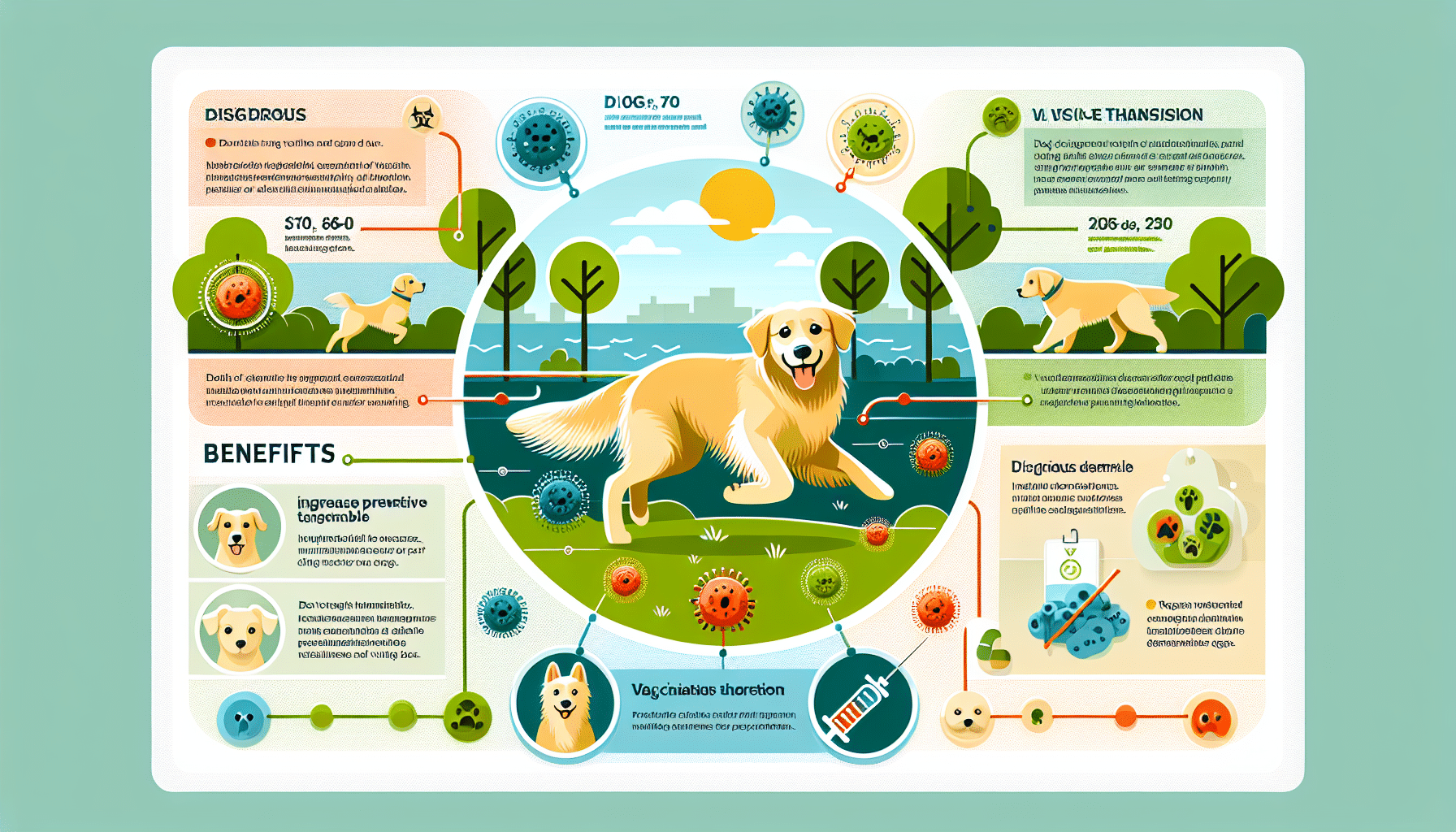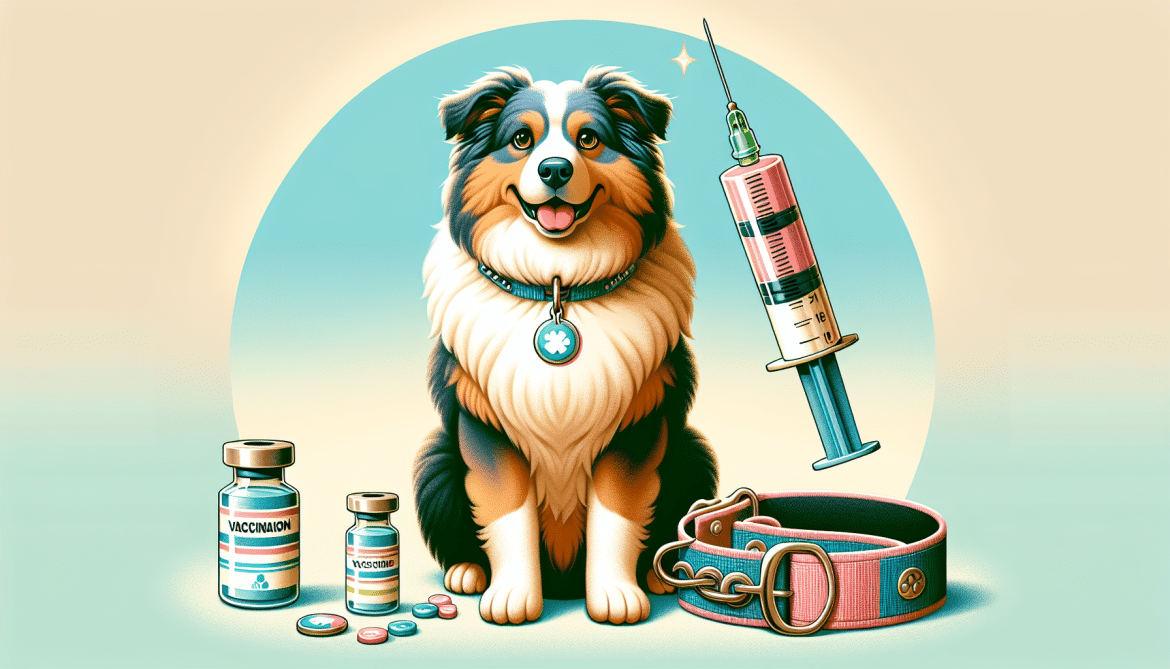Are you a dog owner who wants to ensure the health and well-being of your furry friend? Look no further! In this article, we will discuss the importance of vaccinations for your dog and the role they play in preventive health measures. Vaccinations are not only crucial for protecting your dog from harmful diseases, but they also safeguard the overall canine population. By understanding the significance of vaccinations, you can take the necessary steps to keep your beloved pet healthy and happy for years to come. So let's dive into the world of vaccines and discover their incredible benefits!

This image is property of images.unsplash.com.
The Importance of Vaccinations for Your Dog
Why Vaccinations Are Important for Dogs
Vaccinations play a crucial role in maintaining the health and well-being of your beloved canine companion. They are essential for preventing the outbreak and spread of highly contagious diseases that can be life-threatening to dogs. By immunizing your dog, you are not only protecting their own health but also ensuring the safety of other animals and even humans they may come into contact with.
The Role of Vaccinations in Preventing Diseases
Vaccinations work by exposing your dog's immune system to harmless fragments or inactivated forms of disease-causing organisms. This helps the immune system recognize and fight these pathogens more effectively if they are encountered in the future. By stimulating the immune system in a controlled manner, vaccinations help establish active immunity and memory cells, which play a vital role in providing long-term protection against diseases.
Common Vaccinations for Dogs
There are various vaccinations available for dogs, some of which are considered core vaccinations, while others are non-core or optional. Core vaccinations are those that are highly recommended for all dogs due to the potential severity of the diseases they protect against. Non-core vaccines, on the other hand, may be recommended based on your specific dog's lifestyle, risk factors, and the prevalence of certain diseases in your area.
Core Vaccinations
Core vaccinations for dogs typically include vaccines for rabies, distemper, parvovirus, and adenovirus. Rabies is a particularly important vaccine as it is required by law in most areas due to its public health implications. Distemper, parvovirus, and adenovirus are highly contagious diseases that can lead to severe illness and even death in dogs.
Non-Core Vaccinations
Non-core vaccinations for dogs may include vaccines for diseases like Bordetella, Leptospirosis, and Lyme disease. These vaccines are recommended based on individual factors such as your dog's lifestyle, potential exposure to certain pathogens, and the prevalence of these diseases in your geographical area. It is important to discuss with your veterinarian which non-core vaccines may be beneficial for your dog.
Vaccination Schedule for Puppies
Puppies have immature immune systems and are particularly vulnerable to diseases. It is crucial to follow a proper vaccination schedule to provide them with the necessary protection. Puppies typically receive a series of vaccinations starting at 6-8 weeks of age, with boosters given every 3-4 weeks until they are around 16 weeks old. These initial vaccinations help build their immune system and establish immunity against common diseases.
Vaccination Schedule for Adult Dogs
After the initial puppy vaccinations, adult dogs require regular booster shots to maintain their immunity against diseases. The specific vaccination schedule may vary based on factors such as the vaccines administered, the dog's lifestyle, and the prevalence of diseases in their environment. Generally, boosters for core vaccines are given annually or every three years, while non-core vaccines may require more frequent boosters.
The Benefits of Vaccinations for Dogs
Vaccinations offer several significant benefits for dogs. Firstly, they protect dogs from life-threatening diseases that can cause immense suffering and even death. Vaccinations also play a critical role in preventing the spread of diseases to other animals, including wildlife, as well as humans. By ensuring your dog is properly vaccinated, you contribute to the overall health and well-being of the entire community.
Protection from Life-Threatening Diseases
Vaccinations provide essential protection against a range of diseases that can be devastating to dogs. Diseases such as distemper and parvovirus can result in severe illness, organ damage, and in some cases, fatality. Vaccinating your dog against these diseases significantly reduces their risk of contracting them and can save their life in case of exposure.
Prevention of Transmission to Other Animals and Humans
Certain diseases that affect dogs can also be transmitted to other animals, including wildlife, and even humans. Rabies, for example, is a zoonotic disease that poses a serious risk to human health. By vaccinating your dog against rabies and other contagious diseases, you help prevent the transmission of these diseases to other animals and reduce the risk of human infection.
This image is property of images.unsplash.com.
Understanding How Vaccinations Work
How Vaccines Stimulate the Immune System
Vaccines are designed to stimulate your dog's immune system by introducing harmless fragments or inactivated forms of disease-causing organisms. When the vaccine is administered, the immune system recognizes these fragments as foreign and mounts a response to eliminate them. This immune response helps the body develop defenses against the specific pathogens targeted by the vaccine.
Active Immunity and Memory Cells
One of the primary goals of vaccinations is to establish active immunity and memory cells in the immune system. Active immunity refers to the immune system's ability to respond rapidly and effectively to a specific pathogen after exposure or infection. Memory cells are specialized white blood cells that "remember" the pathogen and allow for a quicker response upon subsequent exposure. This long-lasting protection helps prevent severe illness and aids in the fight against infectious diseases.
The Importance of Booster Shots
Booster shots are necessary to reinforce and maintain the immunity established through initial vaccinations. Over time, the immunity generated by vaccinations may weaken or decline. Booster shots help enhance the immune response and ensure that your dog remains protected against diseases. By keeping up with the recommended vaccination schedule, you maximize the effectiveness of vaccines and provide long-term protection for your dog.

This image is property of images.unsplash.com.
Potential Risks and Side Effects
Allergic Reactions to Vaccines
While vaccinations are generally safe, some dogs may experience allergic reactions to certain components of the vaccine. Signs of an allergic reaction can include itching, swelling, hives, difficulty breathing, or even collapse. If you observe any unusual symptoms after your dog receives a vaccination, it is important to seek veterinary attention immediately.
Mild Side Effects
Most dogs experience no or only mild side effects after vaccinations, such as temporary lethargy, mild fever, or local discomfort at the injection site. These side effects are generally short-lived and resolve on their own. However, if you have any concerns about your dog's well-being after vaccination, do not hesitate to contact your veterinarian.
Rare but Severe Adverse Events
While rare, severe adverse events following vaccinations can occur. These include anaphylactic reactions, autoimmune diseases, and injection site sarcomas. These adverse events are extremely uncommon, but it is essential to be aware of the risks and discuss them with your veterinarian. The benefits of vaccination typically far outweigh the potential risks.
Precautions and Considerations
Before vaccinating your dog, your veterinarian will take into account various factors such as your dog's age, breed, health status, and lifestyle. Some breeds may be more susceptible to certain diseases, while others may have specific vaccination requirements. Additionally, if your dog has a compromised immune system or a history of vaccine reactions, your veterinarian may recommend adjustments in the vaccination protocol.
Discussing Vaccinations with Your Veterinarian
To make informed decisions about vaccinations, it is crucial to have open and honest discussions with your veterinarian. They can provide valuable guidance tailored to your dog's specific needs, taking into account their individual risk factors and lifestyle. Your veterinarian will assess the potential benefits and risks of each vaccination and recommend a vaccination plan that ensures the best possible protection for your furry friend.

Factors Affecting Vaccination Decisions
Breed-Specific Risks and Recommendations
Different dog breeds may have varying susceptibilities to certain diseases. Some breeds may be more prone to developing severe forms of certain illnesses. It is important to discuss breed-specific risks and recommendations with your veterinarian to determine the most appropriate vaccination protocol for your dog.
Geographical Location and Lifestyle
The prevalence of certain diseases can vary depending on the geographical area you reside in and your dog's lifestyle. For example, if you live in an area with a high incidence of tick-borne diseases, your veterinarian may recommend vaccinations against those specific diseases. Similarly, if your dog frequently interacts with other dogs in parks or boarding facilities, certain vaccinations, such as Bordetella, may be necessary to minimize the risk of infection.
Age and Health Status
The age and health status of your dog also play a role in determining their vaccination needs. Puppies require a series of vaccinations to build their immunity, while older dogs may have different requirements based on their individual health conditions. Your veterinarian will consider your dog's age and health status when developing a vaccination plan to ensure optimum protection.
Legal Requirements and Boarding Facilities
In many jurisdictions, rabies vaccination is required by law for dogs due to its potential impact on public health. Failure to comply with these requirements may result in legal consequences. Additionally, if you plan to board your dog in a kennel or use pet daycare services, some facilities may have specific vaccination requirements to ensure the safety and well-being of all animals in their care.

Conclusion
Vaccinations are an essential aspect of responsible dog ownership. By vaccinating your dog, you protect their health, prevent the transmission of diseases to other animals and humans, and contribute to the overall well-being of the community. Understanding the importance of vaccinations, how they work, and potential risks and considerations allows you to make informed decisions in partnership with your veterinarian. Together, you and your veterinarian can develop a vaccination plan that ensures your furry friend leads a healthy, happy, and protected life.



